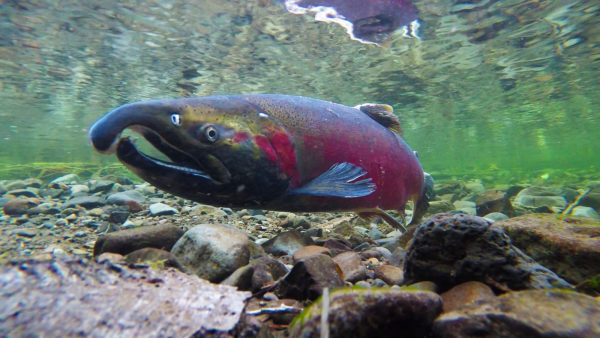
A Coho salmon, local to B.C.’s coasts. Photo by Bureau of Land Management Oregon and Washington via Flickr
If you want to learn a lot about fishing without looking like you’re reading about fishing, this might be the book for you.
I read Bill Gaston’s new memoir, Just Let Me Look at You, in my backyard, enjoying the first of the summer weather, and it’s a setting I’d recommend. While the book deals with complicated topics like family, addiction, and ageing, it’s well-balanced with moments of humour and irony. With a meandering pace and a colloquial but meditative tone, one could imagine this book as a collection of reminiscences doled out by an older relative on a quiet evening, and it reads well chapter by chapter, each section leaving plenty to sit with.
Gaston is best known for fiction writing, which he’s taught in the Writing department at UVic since 1998 — this is his second foray into non-fiction, following the self-described 2006 “bullshit memoir” Midnight Hockey. Part travel journal and part family history, Just Let Me Look at You is framed by the story of Gaston’s pilgrimage back to Egmont, a fishing spot from his youth, after his father’s death. The story is subdivided into 11 chapters and an epilogue, each roughly themed around an opening epigraph, but containing recollections from a variety of times and places which range from Gaston’s father’s childhood all the way to his own experiences with his four children.
It is this sense of honesty, and the intensely empathetic exploration of family bonds that stems from it, that give this memoir resonance beyond its niche of fatherhood and fishing.
The book moves slowly in the first half, but begins to build tension past the midpoint as the more difficult questions about Gaston’s father are increasingly addressed. It is this father-son relationship that is central to the piece, a relationship whose saving grace seems to be a shared love of fishing — almost a cliché, but the subject is treated with enough specificity to keep it fresh. Any west-coast fisher or wilderness-lover will likely find places and experiences they recognize.
The most intense thread in the memoir is Gaston’s relationship to his father’s alcoholism and troubled past, and the honesty and compassion with which these subjects are dealt with. I read Gaston’s novel Sointula last summer and was struck by the development of the characters, who are eccentric and more often abrasive than endearing, yet strangely likeable for it. This same well-rounded treatment of characters is applied in Gaston’s representation of real figures in his life — in essence, this memoir reads as a portrait of his father, sketched to the best of his ability, but with awareness of the shortcomings that exist in our knowledge of the people around us.
Gaston doesn’t shy away from awkward blunders, tinges of raunchy humour, or, most importantly, from moments of disappointment — nor does he paint himself as a saint, freely acknowledging the ways, good and bad, that he is like his father, and the times he feels he sold the man short. It is this sense of honesty, and the intensely empathetic exploration of family bonds that stems from it, that give this memoir resonance beyond its niche of fatherhood and fishing.
While Just Let Me Look at You is no page-turner and may not appeal to everyone, it is well-balanced — thoughtful without being too heavy, and heartfelt without being cheesy. And it achieves the basic tenet of memoir — to connect the personal with something universal. It’s a worthwhile read for anyone interested in how family and place shape us, and the limits to how well we really know even the people closest to us.







